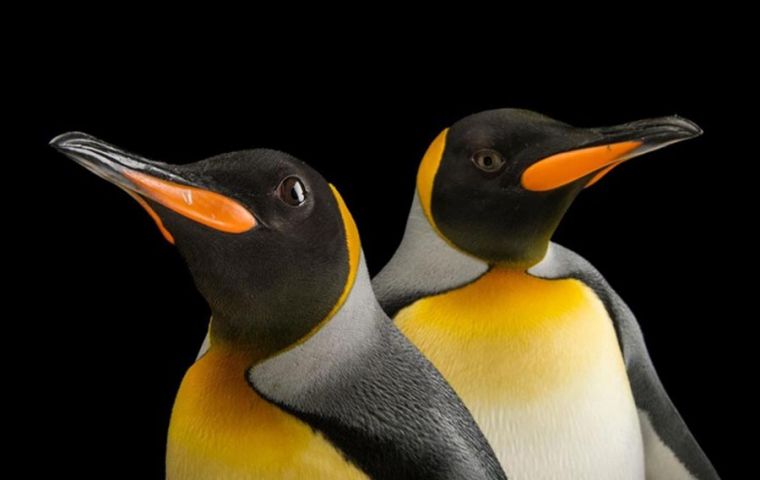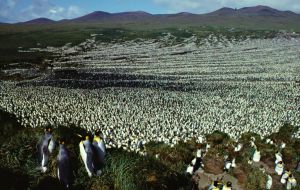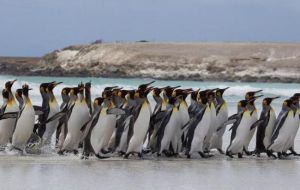MercoPress. South Atlantic News Agency
King penguins down to 10% of original population in three years in French island
 Satellite images and photos taken from helicopters show penguin population has collapsed, some 200,000 remaining, according to a study in Antarctic Science
Satellite images and photos taken from helicopters show penguin population has collapsed, some 200,000 remaining, according to a study in Antarctic Science  King penguins are home bodies, and the species does not migrate. But why the colony on Ile aux Cochon has been so decimated remains a mystery.
King penguins are home bodies, and the species does not migrate. But why the colony on Ile aux Cochon has been so decimated remains a mystery.  “It is completely unexpected and significant since this colony represented nearly one third of the king penguins in the world,” said lead author Henri Weimerskirch
“It is completely unexpected and significant since this colony represented nearly one third of the king penguins in the world,” said lead author Henri Weimerskirch  Sub-species of Kings includes Aptenodytes patagonica patagonicus which inhabits the Falklands and South Georgia Island. Volunteer Point in Falklands
Sub-species of Kings includes Aptenodytes patagonica patagonicus which inhabits the Falklands and South Georgia Island. Volunteer Point in Falklands The planet's largest colony of King penguins has declined by nearly 90% in three decades, alarmed researchers said on Monday. The last time scientists set foot on France's remote Ile aux Cochons — roughly half way between the tip of Africa and Antarctica — the island was blanketed by two million of the flightless birds, which stand about a meter tall.
But recent satellite images and photos taken from helicopters show the population has collapsed, with barely 200,000 remaining, according to a study published in Antarctic Science.
King penguins are home bodies. While adults will set to sea for days at a time foraging for food, the species does not migrate. But why the colony on Ile aux Cochon has been so decimated remains a mystery.
“It is completely unexpected, and particularly significant since this colony represented nearly one third of the king penguins in the world,” said lead author Henri Weimerskirch, an ecologist at the Centre for Biological Studies in Chize, France, who first set eyes on the colony in 1982.
In 1997, a particularly strong El Niño weather event warmed the southern Indian Ocean, temporarily pushing the fish and squid on which king penguins depend south, beyond their foraging range.
“This resulted in population decline and poor breeding success” for all the king penguin colonies in the region, Weimerskirch said.
El Niño are cyclical events that occur every two to seven years. But they can be amplified by global warming, which itself produces many of the same results, albeit on a longer timescale.
Indeed, Weimerskirch and colleagues showed in an earlier study that climate change, on its current trajectory, will likely make the Iles Crozet — the archipelago that contains Ile aux Cochon — unviable for King penguins by mid-century. Migration is not an option because there are no other suitable islands within striking range.
Other factors may be contributing to the decline of the Ile aux Cochon colony, including overcrowding.
“The larger the population, the fiercer the competition between individuals,” noted a statement from France's National Centre for Scientific Research, which funded the study.
“The repercussions of lack of food are thus amplified and can trigger an unprecedented rapid and drastic drop in numbers.” But this so-called “density-dependent effect” can also be made worse by climate change, the study notes.
Another possible culprit is avian cholera, which has affected seabirds on nearby Marion and Amsterdam Islands, including some King penguins.
But until Weimerskirch and other researchers return to Ile aux Cochons — hopefully, he said, in early 2019 — they won't know for sure. It is also possible that invasive species such as rats, mice or cats, have found their way onto the island.
The Red List of Threatened Species conservation status for King penguins is currently “least concern,” but the new data may prompt a reevaluation.
King penguins are the second-largest penguin species after the Emperor. They do not make a nest, but rather lay one egg at a time and carry it around on their feet covered with a flap of abdominal skin, called a brood patch.
Parents take turns incubating the egg, switching every couple of weeks over a two-month period.
There are two sub-species of Kings. Aptenodytes patagonica patagonicus inhabits the Falklands and South Georgia Island, while Aptenodytes patagonica halli resides in the southernmost reaches of Indian Ocean and South Pacific.




Top Comments
Disclaimer & comment rulesCommenting for this story is now closed.
If you have a Facebook account, become a fan and comment on our Facebook Page!